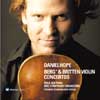Berg; Britten Violin Concertos
Assured playing makes this a welcome first coupling of two elegiac concertos
View record and artist detailsRecord and Artist Details
Composer or Director: Alban Berg, Benjamin Britten
Genre:
Orchestral
Label: Warner Classics
Magazine Review Date: 5/2004
Media Format: CD or Download
Media Runtime: 65
Mastering:
Stereo
DDD
Catalogue Number: 2564 60291-2

Tracks:
| Composition | Artist Credit |
|---|---|
| Concerto for Violin and Orchestra, 'To the memory of an angel' |
Alban Berg, Composer
Alban Berg, Composer BBC Symphony Orchestra Daniel Hope, Violin Paul Watkins, Conductor |
| Concerto for Violin and Orchestra |
Benjamin Britten, Composer
BBC Symphony Orchestra Benjamin Britten, Composer Daniel Hope, Violin Paul Watkins, Conductor |
Author: kYlzrO1BaC7A
Their proximity in time – 1935 and 1939 – and the influence of Berg’s music on the young Britten makes the their violin concertos a natural coupling that, surprisingly, has remained untried until now. With Daniel Hope having made his reputation with recital discs for Nimbus, and cellist Paul Watkins at the outset of his conducting career, omens for this collaboration were good and have generally been fulfilled.
Less so in the Berg, perhaps. The Andante of Part 1, sensitively delivered if lacking in cumulative tension, typifies their approach: one in which the Allegretto’s pervasive Ländler is rather literally inflected, and the outer sections of Part 2’s Allegro are forceful without becoming a life-and-death struggle. Yet the accompanied cadenza is finely sustained (2'09") – and, after an eloquent transition, Hope makes the Adagio a fitting formal and expressive culmination. Perhaps the performance would have taken flight had Watkins sacrificed a little of his concern for orchestral shading and balance, and let the music’s emotional charge come through. Few recordings convey more of the work’s content (though the use, for the first time on disc, of the new critical edition by Douglas Jarman may in part account for this), but numerous others have captured more fully the extent of its existential doubt.
Less intensely ‘worked’ as music, the Britten encourages a keener overall response. The restiveness of the Moderato is well caught – with a touchingly bittersweet transition back to the main theme (4'31") – as are the scherzo’s engaging Prokofiev-isms. Hope dispatches the cadenza with assurance, and if characterisation in the constituent variations of the passacaglia can be a little at the expense of its overall design, progress towards the orchestral climax feels rarely less than inevitable; the elegiac apotheosis itself (11'04") is affectingly resigned. At almost 36 minutes, this is possibly the most expansive reading on disc, but with Hope so much more inside the piece than Maxim Vengerov in his recent recording, and Watkins finding the overall cohesiveness that eludes Mstislav Rostropovich, such a consideration rarely comes to mind.
Comparisons elsewhere are less clearly in the newcomer’s favour. Rebecca Hirsch’s accounts of both concertos, less cleanly recorded and with a slightly rougher orchestral response, have a spontaneity and impulsiveness more likely to hold the attention on repeated hearings – while Itzhak Perlman and Mark Lubotsky remain central recommendations for Berg and for Britten respectively. Admirers of Hope will not be disappointed, however, and those attracted by the pairing can proceed with confidence.
Less so in the Berg, perhaps. The Andante of Part 1, sensitively delivered if lacking in cumulative tension, typifies their approach: one in which the Allegretto’s pervasive Ländler is rather literally inflected, and the outer sections of Part 2’s Allegro are forceful without becoming a life-and-death struggle. Yet the accompanied cadenza is finely sustained (2'09") – and, after an eloquent transition, Hope makes the Adagio a fitting formal and expressive culmination. Perhaps the performance would have taken flight had Watkins sacrificed a little of his concern for orchestral shading and balance, and let the music’s emotional charge come through. Few recordings convey more of the work’s content (though the use, for the first time on disc, of the new critical edition by Douglas Jarman may in part account for this), but numerous others have captured more fully the extent of its existential doubt.
Less intensely ‘worked’ as music, the Britten encourages a keener overall response. The restiveness of the Moderato is well caught – with a touchingly bittersweet transition back to the main theme (4'31") – as are the scherzo’s engaging Prokofiev-isms. Hope dispatches the cadenza with assurance, and if characterisation in the constituent variations of the passacaglia can be a little at the expense of its overall design, progress towards the orchestral climax feels rarely less than inevitable; the elegiac apotheosis itself (11'04") is affectingly resigned. At almost 36 minutes, this is possibly the most expansive reading on disc, but with Hope so much more inside the piece than Maxim Vengerov in his recent recording, and Watkins finding the overall cohesiveness that eludes Mstislav Rostropovich, such a consideration rarely comes to mind.
Comparisons elsewhere are less clearly in the newcomer’s favour. Rebecca Hirsch’s accounts of both concertos, less cleanly recorded and with a slightly rougher orchestral response, have a spontaneity and impulsiveness more likely to hold the attention on repeated hearings – while Itzhak Perlman and Mark Lubotsky remain central recommendations for Berg and for Britten respectively. Admirers of Hope will not be disappointed, however, and those attracted by the pairing can proceed with confidence.
Discover the world's largest classical music catalogue with Presto Music.

Gramophone Digital Club
- Digital Edition
- Digital Archive
- Reviews Database
- Full website access
From £8.75 / month
Subscribe
Gramophone Full Club
- Print Edition
- Digital Edition
- Digital Archive
- Reviews Database
- Full website access
From £11.00 / month
Subscribe
If you are a library, university or other organisation that would be interested in an institutional subscription to Gramophone please click here for further information.




